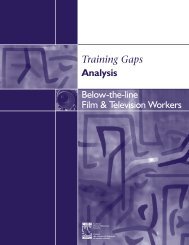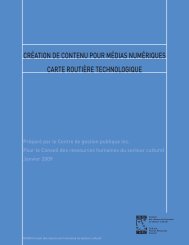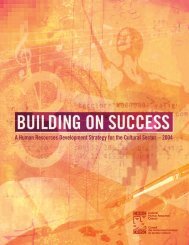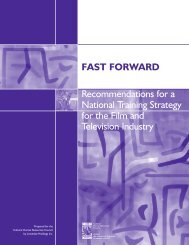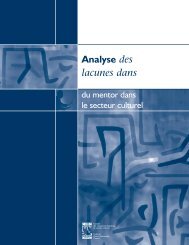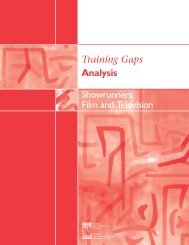Presenters Training Gaps Analysis - Conseil des ressources ...
Presenters Training Gaps Analysis - Conseil des ressources ...
Presenters Training Gaps Analysis - Conseil des ressources ...
Create successful ePaper yourself
Turn your PDF publications into a flip-book with our unique Google optimized e-Paper software.
<strong>Presenters</strong> training gaps analysis – final report<br />
Skills acquisition<br />
Understanding how presenter skills are acquired at present is relevant to assessing training gaps.<br />
Skills acquisition tends to happen through five main channels:<br />
• Post-secondary education – Post-secondary education occurs widely in the profession.<br />
However, most post-secondary education received is not from programs specifically <strong>des</strong>igned<br />
to teach presenting (since they do not exist). Traditional university humanities programs such<br />
as theatre, music, and the performing arts will continue to contribute professionals entering<br />
the industry; as such students are often individuals passionate about developing a career in<br />
the performing arts. Arts management, business administration, and technical theatre<br />
programs, although not geared towards presenters, teach many skills presenters require.<br />
• Experience – Presenting is learned through experience; informants reiterate this fact. Some<br />
presenters have backgrounds in the arts, or are artists themselves, and develop into the role<br />
of presenter gradually as they become involved in putting on performances. Understanding<br />
of performance arts is developed through time spent on the job, experience, trial and error,<br />
successes, and setbacks. This practical experience is crucial to the skills acquisition<br />
process.<br />
• Professional development – <strong>Presenters</strong> participate in professional development activities in<br />
the form of workshops, symposia, and one-off course offerings, often organized in<br />
conjunction with conferences, showcases, and Contact events. Professional development is<br />
discussed in greater detail below under the section <strong>Training</strong> offerings.<br />
• Provincial arts and touring organizations (e.g., BC Touring Council, CCI, etc.) arrange<br />
Contact events throughout the year to provide presenters opportunities to meet artists,<br />
agents, managers and programmers. At these events, presenters can watch various live<br />
performances and network with peers. An important feature of Contact events is the<br />
“contact rooms” which allow presenters to talk directly to the artists about the<br />
performance, venues and the artists’ availability.<br />
• These events help showcase the performing arts on tour in Canada. <strong>Presenters</strong> often<br />
come to Contact events to book performances for their venues. Examples of Contact<br />
events include: BC Contact offered by BC Touring Council, Contact Ontario offered by<br />
Réseau Ontario, and Contact East offered by the Atlantic <strong>Presenters</strong> Association.<br />
• Networking – <strong>Presenters</strong> emphasize the importance of on-the-job learning networks to this<br />
profession in particular. Peer feedback and appraisal is valued, and close cooperation is<br />
sometimes necessary. Presenting fosters learning through networking events such as<br />
Contact events (regional and national), booking conferences, showcases, symposia, festivals<br />
and other performances. <strong>Presenters</strong>’ networks and touring association networks are<br />
appropriate channels to deliver training.<br />
Direct contact with knowledgeable peers is the best way to cultivate industry knowledge. It<br />
helps to develop an appreciation of new genres and keep abreast of new trends and<br />
audience tastes. <strong>Presenters</strong> also rely heavily on networks of trusted peers to manage artists<br />
and plan event logistics; those who have either presented an artist in the past or are familiar<br />
with a genre can help mitigate the financial risks of a performance for presenters who operate<br />
under budgetary constraints (particularly at the volunteer or community level).<br />
June, 2007<br />
07chrc02<br />
Page 16




